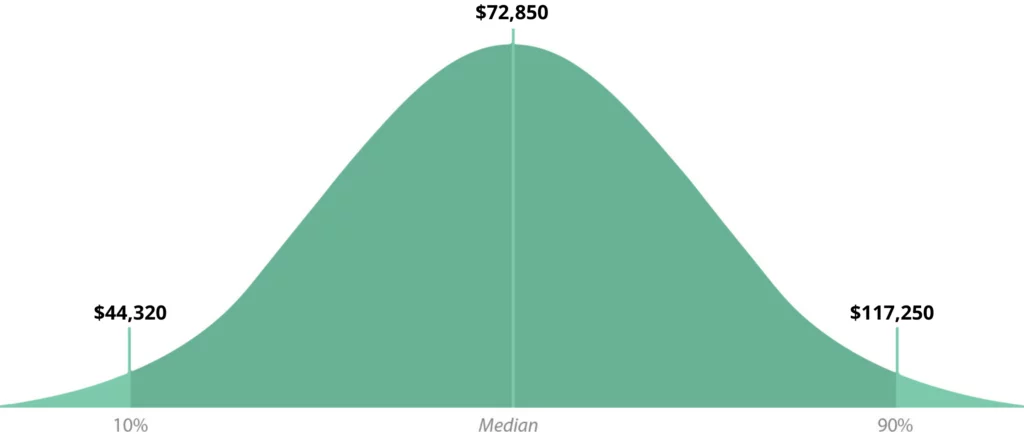
1. Overview: Job Responsibilities, Salary, and Common Requirements
2. A Comprehensive Guide to Becoming a Technical Writer
3. What Does a Technical Writer Do?
4. Signs You Should Consider Becoming a Technical Writer
5. How Do You Become a Technical Writer?
6. What are the Knowledge and Skills Needed to be a Technical Writer?
7. Popular Schools and Colleges in the U.S. for Aspiring Technical Writers
8. How to Get a Job as a Technical Writers
9. Learn About Geographic and Location Pay Differentials
10. Make Your Resume Stand Out
Technical writers made a median salary of $72,850 in 2019. The best-paid 10 percent made $117,250 that year, while the lowest-paid 10 percent made $44,320. So, what are you waiting for? There is a market where people are searching for ‘write an essay for me’, which you can capitalize on and settle for a good career.


IT Technicians
Computer Programmers
Editors
Interpreters and Translators
Public Relations and Fundraising Managers
Public Relations Specialists
Writers and Authors
Underwriters
Writing skills
Research skills
Interviewing skills
Problem-solving skills
Writing style guides
Technical writing software tools
Typesetting
HTML
JavaScript
C#
C++
Python
The importance of technical writers in an industry is immeasurable. They help a person understand more complicated information because of the technicalities and help teams to understand how a specific thing works–for example, new software–to help the completion of a project.
This type of work requires a person to have exceptional comprehension skills so that they can translate intricate information into a simple language that anybody can understand. When it is written to an instruction, anybody can read and interpret it with no issues.
Like other forms of writing, technical writing has its own distinct characteristics, such as:
Technical writers transform complex and technical information into a written material that can be easily understood by a target audience. These written materials are in the form of white papers, instruction manuals, technical manuals, training guides, journal articles, how-to guides, assessments, and other documents.
Technical writers usually work in an office setting as part of a team or by themselves. They can be found working in fields such as software, government, consulting, telecommunications, academic, health, security, broadcasting, publishing, transportation, and energy–the list could go on and on. Therefore, they must be familiar with the background of the industry they will be working for so that they can explain the complex information to people that have different knowledge.
Technical writers mainly work with technology experts, engineers, and scientists to assist in the flow of information within an industry or organization. If you choose to work as a technical writer, you may find a job under these following industries:
There are plenty of reasons why you may consider becoming a technical writer. Here are some of the benefits you can enjoy if you choose to go down this career path:
While the term “technical writer” may sound almost clinical and too serious, there is actually some degree of creative liberty that technical writers can enjoy on the job. While you may have to deal with technical information, you also need to find creative ways to convey that in such a way that your readers will understand, appreciate, and even enjoy.
Technical writers enjoy an average annual salary of about $72,850. You can earn upwards of a hundred thousand dollars a year if you are among the best-paid ones. What’s more is that according to BLS, there is a projected increase of 7% or 4,300 more technical writing jobs to open between 2019 and 2029, so you have a fair amount of opportunity.
Technical writers need to possess a certain set of skills in order to become successful. Analytical thinking, communication, and the ability to interact with people in the industry such as scientists, inventors, and engineers are a must. Therefore, you can expect to gain a host of unique skills that are exclusive to the industry you are writing for. Personal development would be a lifelong process throughout your entire career as a technical writer.
Some people are naturally born with specific qualities that other people don’t have. If you think you would make a great technical writer, there might be some signs that you have missed that would point out that you could become one. Here are the traits of a good technical writer.
You don’t react negatively when someone gives you feedback or criticizes your work. Most people see criticism as demoralizing and hurtful, but some people positively take criticism. As a technical writer, you will be experiencing clients that are demanding and would like you to write documents that are according to their specifications. You can’t blame these clients for having strict guidelines of what the content and formatting of the document should be like as they have a corporate look that they are maintaining.
Understanding one’s situation, motives, and feelings is one of your traits. You put yourself into the shoes of the other person and try to understand them based on their own perspective. Without empathy, you won’t have a clear objective of reality and you will most likely fail to consider your target audience’s needs. So when you create a document of a certain product from the perspective of a particular industry and don’t use their jargon and technical information, your target audience would not understand your document. Empathy will help a technical writer understand the needs of a target audience.
You can precisely and accurately describe facts to a person. You do your own research on the information that you are receiving, making sure that they are correct, and you do not rely just on the information from a person that they cannot adequately substantiate. Good technical writers are able to understand and break down information into parts, understand how each component works, and explain it to their audience clearly.
The main purpose of a document a technical writer is creating is to explain how a specific thing works in a layman’s term so that people can understand the information. When you have a heart of a teacher, you have a strong desire to teach, inspire, demonstrate, and build something. You will also find a way to make what you are writing more relatable so that anybody can learn from it.
It bothers you when you see content structures that are vague and not organized. You want the information you are reading to be structured and aesthetically arranged. Technical writers create layers and hierarchies of information, and this is by using headings, lists, bullets, diagrams, charts, and other images that will support the information. They also use the order of importance pattern, which means that the most precedence issue or topic is addressed first before the subsequent topics.
You are always curious and you want to dig more details on the information that you are acquiring. Some people tend to avoid subjects that are difficult for them, but you have a developed growth mindset that always makes you inquisitive. The more you discover, the more your appetite in learning increases. Technical writers are fast learners. They quickly understand complex information and can explain them to people clearly in simple words.

The requirements to become a technical writer have no rules and aren’t set in stone. In fact, a high school degree is a minimum education requirement to qualify you for a technical writer position, as long as you have the skills and knowledge to do the job. However, most employers would typically prefer candidates who possess the following:
Employers usually hire candidates that have obtained a bachelor’s degree in journalism, English, or other communication-related courses. They also consider candidates who have a background in technical subjects such as engineering, computer science, or even medicine. Web designing is also growing its popularity as there is an in-demand need for online technical documentation. Thus, students may choose a double major or a certificate in the field of their interests.
There are also some schools that offer bachelor’s degrees in technical and professional writing programs to students that are interested in pursuing education in writing and STEM fields (science, technology, engineering, and mathematics.) These programs give students an introduction to what technical writers do, such as writing, editing, and designing documents.
An associate degree is an education for the undergraduate level who wants to gain basic technical knowledge for employment or add additional skills and knowledge in their chosen technical writing career. Aspiring technical writers who opt to take an associate degree program will have an edge in getting hired as they will learn tips, practice their technical writing, edit, and learn how to design professional materials.
Technical writers do not just need to be good in writing; they also need to be a technology savvy as well. Part of their job is to create, format, and layout the content of the documents based on the client’s requirements and specifications. They must be familiar with software like Madcap Flare, Microsoft Office Suite, Microsoft Visio, Adobe Creative Suite, Adobe FrameMaker, and Lotus Notes. Learning how to use certain codes will also help them for the technical writing job–such codes are C++, C#, HTML, XML, Python, and Javascript.
You can volunteer for the sake of getting experience or work part-time for a business. Having hands-on experience as a technical writer is essential because it will help develop transferable skills for the workplace. Other reasons why you should have hands-on experience are:
All professions require specific skills to become successful in a particular field in order to become successful. These are some of the important knowledge and skills a technical writer must possess.
Technical writers should be, well, good in writing. The content in documentation should be clear and understandable, and this can only be achieved if the writer is skilled. When you are good at writing, you are also good at teaching because you can explain complicated information and make content clearer. You can also explain the instructions and other important details in a logical structure, making the document clearly understood by the readers.
This is the ability to thoroughly search, extract information, evaluate, and study a topic. By having research skills, the technical writer is able to interpret the information using reliable sources. You have the ability to think about what information will be included and excluded and which information is critical and related to a certain topic.
Technical writers are good at finding answers to questions and fixing problems that arise. Often times, technical writers encounter or discover problems while they are creating the documentation of a product. Instead of becoming frustrated and giving up in finding a solution, what they do is solve their problems by using their research skills, as well as record the problem to document the potential problems future users would experience.
Technical writers don’t just work on their own when they write product documentation. They also work closely with subject matter experts in business (also known as SMEs) and gather important information by conducting an interview. The SMEs are people who have in-depth knowledge of a particular technology or process. Here are some tips that you may follow that could help you in conducting interviews with SMEs.
You should have the technical ability and knowledge to complete a task. These skills are usually related to information technology, mechanical, scientific, or mathematical tasks–for example, being an expert in engineering or programming languages such as HTML, Java, or PHP. Having the ability to use technical writing tools such as Acrobat, mark-ups, typesetting, Hemingway, FrameMaker, and Visio is also part of technical proficiency that a technical writer should know.
Choosing a school where you will start to pursue a career in technical writing should help you become whatever you want to be. Schools should not only expand your knowledge but also help mold you to become a better person and leader. Choosing the right school depends on your priorities and interests. Here is the list of the top 50 best colleges with professional and technical writing degrees in America(2020).

It has been easy to find jobs these days compared to before when we do not have the Internet and need to personally go to companies, bombarding them to submit your application–even if you are not sure if they are hiring or not. Job seekers have now found creative and easy ways to snag their dream careers. Here are a few simple tips.
Using job search engines is the easiest and convenient way of finding a job as a technical writer. You will find a lot of job opportunities working for big companies or even working in the comfort of your home. Here are some of the top job search engines sites that you can try.
If you are serious about finding a job, creating and organizing your own job listing would definitely be a help, especially if you are applying to numerous companies. Also, it will help you track your application and send follow-up messages regarding the status of your application.
Most jobs are not advertised; therefore, having a network in the technical writing industry will help you locate a job opportunity. There are two types of networking: personal and online. You can establish personal networking through friends and family members who are in the same field as you are. You can also connect with other technical writers by attending events or joining groups. There are also various online tools that you can use to build your professional network like LinkedIn. You can also meet other technical writers using social networking sites like Facebook.
Geographic areas often have location pay differentials, making a significant impact on your potential earnings. Some states offer a higher salary and some with a lower wage to technical writers.
Here’s a list of the average mean of annual revenues of technical writers in every state according to the latest data from the Bureau of Labor Statistics’ Occupational Employment Statistics:
Report from the Bureau of Labor Statistics
Your resume is proof of your background and qualification for the job. The technical writer’s resume is a bit different from other resume layouts since the job itself calls for strong communication and technical skills. Although you got the right educational background and experience, most hiring managers will evaluate your technical writing skills from your resume alone. So how do you write a technical writer resume? Here are some tips.
A resume header is placed at the top part of your resume. It includes your name, location, phone number, email address, and LinkedIn ID (optional). Take time to format your resume header correctly.
Start with your name, and make it the most visible part of your resume or resume header. Use big fonts (example 14-16 points) or even use a different font color to make your name stand out. Don’t forget to use proper spacing as well.
At the bottom part of your name should be your resume title. It is your work profile or what you do professionally e.g., Technical Writer. The font used should be smaller than your name (example 1 or 2 points smaller than the name of your font, or use a regular size font). You can also use a different font color if you prefer.
For your address, you do not need to include everything–simply list your city or region. Employers just want to check if you live near their office.
The phone number that you will be using for your application should be widely accessible, ideally with a voicemail set up in case you miss their call.
Lastly, use a professionally-looking email address containing your first and last name.
Technical writers are good at summarizing a lot of information into a condensed version that explains all the main points.
A resume summary statement is a short paragraph composed of two to three sentences that highlights your qualifications and experiences. This should be placed at the beginning of your resume so that the hiring manager would have a glimpse of what you offer before diving into your resume.
Hiring managers receive a lot of resumes, and writing a strong resume summary at the beginning of your resume will help you stand out from the rest of the applicants. Resume summary statements are also referred to:
The work experience section is the most crucial part of a resume because it explains your previous jobs and experiences. So how do you write an impressive work experience? You should write a short story proving how well you did. This is by highlighting your achievements and not just your duties and responsibilities.
You need to be specific with the skills that will be included in your resume, bearing in mind that those skills should be related to technical writing. Here are some of the commonly required skills in technical writing.
The format of your resume should not be copied from someone else’s resume. Some hiring managers check the metadata of a resume. This is to see if the applicant originally made the format of the resume. They also check the line spacing, indentation, and word spaces if it is an easy-to-read format.
An interview is a common requirement when applying for a job position. There are a lot of qualified candidates who lose their chance of getting hired because of a bad interview. Therefore, you must prepare. Here are a few interview questions for technical writer candidates.
What the interviewer wants to know is how passionate you are as a technical writer. For some, technical writing is a dull job because you will be writing different kinds of reports, instructions, and product descriptions.
You should convince the interviewer enthusiastically that you enjoy the tasks of a technical writer and not just because the job pays well. You can also demonstrate your skills and strengths in technical writing that makes you the best candidate to hire.
Technical writers also use software tools to help them create, design, manipulate images, draw, and publish documentation that they can easily customize and edit. The more you know how to use different technical writing software, the more you will leave a good impression on your interviewer. Some of the most popular tools are WordPress, MediaWiki, MagLoft, Calameo, Whatfix, oXygen XML author, Atavist, Prezi, MadCap Flare, etc.
It is essential for technical writers to be familiar with different citation styles for reference as they use that for more advanced projects. Citations are a way of giving credit to the source of information to avoid plagiarism. The most common style technical writers are using is the American Psychological Association (APA) citation style. In answering this question, you must do research on what citation style your potential employer prefers to use.
Put yourself in the employer’s shoes. If you were to hire a technical writer, what are the good qualities you’d be looking for? Some of the top characteristics of a good technical writer are:
There are different challenges a technical writer usually deals with. It can be:
What the interviewer wants to know is how you approach the challenges. Recall an issue that you have resolved and you think was a success. Explain the process or methods you used to solve the problem. Highlight what you have learned from that experience and how it helped you grow as a technical writer.
Sharpen your skills in technical writing by taking these top online courses
Skills Success has carefully curated and organized thousands of online video courses. Start your journey to becoming a technical writer with these top online courses.









